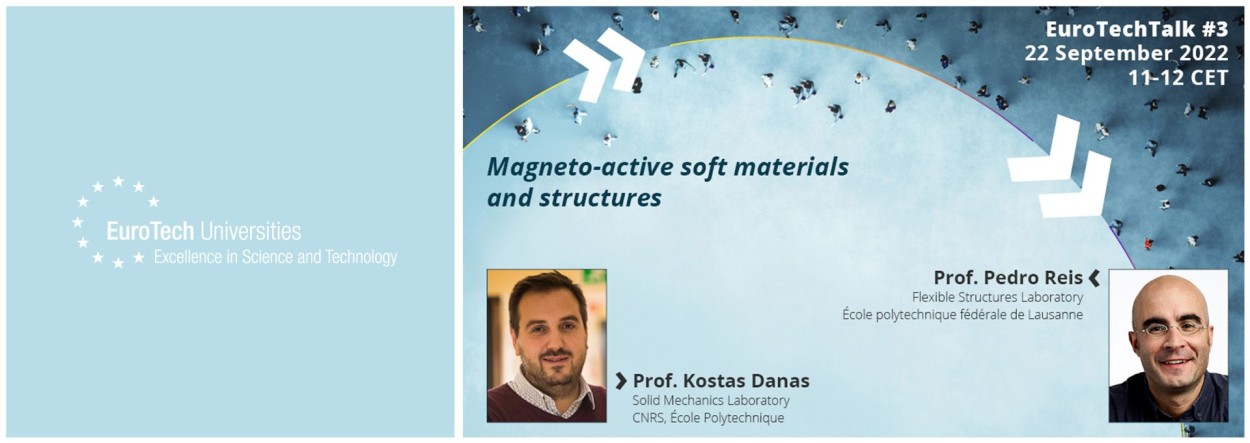EuroTech Talks – Scientific lectures across Europe

The new series of scientific lectures, “EuroTech Talks”, puts the spotlight on excellent collaborative research projects conducted at the six partner universities of the EuroTech Alliance1, including École Polytechnique. Centered on “magneto-active soft materials and structures”, the third EuroTech Talk took place on September 22nd, 2022.
Demonstrating their complementary expertise, Kostas Danas, research director at CNRS and professor at l’X, Solids Mechanics Laboratory (LMS)2, and Pedro Reis, professor at École polytechnique fédérale de Lausanne (EPFL), presented recent research conducted on magnetorheological elastomers (MREs) at École Polytechnique and EPFL (Switzerland).
MREs are composites comprising magnetic micron-sized particles embedded randomly in a polymer matrix and represent a novel class of active materials capable of exhibiting a coupled response under external magnetic and/or mechanical stimuli. Kostas Danas and Pedro Reis first met in 2018 when Pedro Reis visited École Polytechnique on the occasion of a PhD dissertation defense. They have kept exchanging on their research focused on MREs, different approaches, and their complementarity. They recently also taught a dedicated course at the CISM summer school in Italy.
In their lecture, Kostas Danas and Pedro Reis focused on the fabrication, experiments, and modeling of MREs to deliver configurational and geometrical changes with minimal external magnetic fields. They also discussed novel applications MREs can find in biomedical devices and soft robots.
“My research has focused on MREs for the last twelve years. These active materials are simple to fabricate, but their potential in high-end applications (in biomedical devices, for example) only now starts to become apparent”, explains Kostas Danas and adds: “For a more comprehensive understanding, we developed in parallel a large number of software and numerical tools allowing us to study MREs as also other materials with more general coupled properties (electric, thermal, chemical, etc).”
Initiated by the EuroTech Alliance in June 2022, the online lecture series EuroTech Talks invite renowned scientists on stage to share their knowledge with peers at the six member universities of the alliance. The joint seminars offer a platform to present joint research projects and further European scientific collaboration. Each session brings together two researchers from two EuroTech partner universities, experts in a given scientific field, and provides an occasion to discuss the latest research in the given domain. The lectures are also open to students and the wider public.
The first edition, EuroTech Talk #1, focused on “Nanophotonic and single-molecule biosensing” and the second edition centered on “Green additive manufacturing”.
EuroTech Talk #3 on “Magneto-active soft materials and structures” is accessible in replay.
1 The six EuroTech Universities are École Polytechnique (L’X), École Polytechnique Fédérale de Lausanne (EPFL), Eindhoven University of Technology (TU/e), Technical University of Munich (TUM), Technical University of Denmark (DTU), and Technion Israel Institute of Technology.
2 the Solids Mechanics Laboratory (LMS) is a joint research unit between CNRS and École Polytechnique - Institut Polytechnique de Paris
 Support l'X
Support l'X